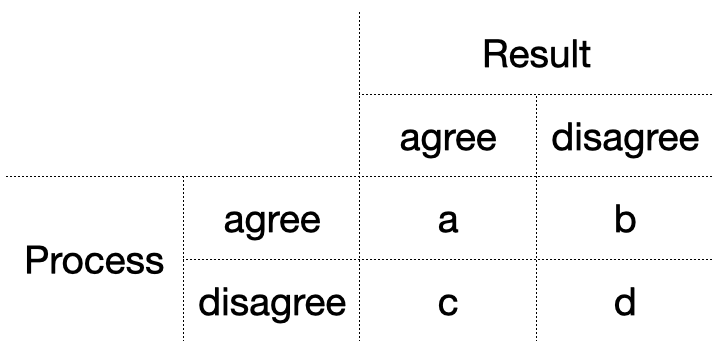On the wall stands a motto: ‘The right person, making the right decisions at the right time, for the right reasons’
From Lamb et al., 2015
I wonder how many people can (and do) differentiate between:
«I agree with the result of the decision.»
and
«I agree with how the decision was made.»
And how many people would support a decision depending on which was violated.

Let’s look at the four cases (using a simplified 1:0 model, not grades of agree-disagreement). The consistent cases a) and d) are pretty straightforward but tell us little.
a) You agree with the process and the result. Both are positive (to you), so support should be pretty straightforward. But you have no indication whether it’s due to process or result.
d) You disagree with the process and the result. Both are negative (to you), so not supporting the decision should be pretty straightforward. But again, you have no indication whether it’s due to process or result.
More interesting are the two inconsistent cases b) and c):
b) You agree with the process but disagree with the result. For example, you agreed on a democratic vote, and you get the result you did not want to have. You could «disagree but commit», making your position clear but still support the decision. Or you could not support the decision, no matter that you aggreed to the process. I think the behavior that shows integrity would be to «disagree but commit» — and making sure *beforehand* never to take part in a process in which you could not live with the result.
c) You disagree with the process but agree with the result. For example, you do not think that the state should decide for the individual, but the state forces its citizens to do something you think is beneficial (to the world, to you, etc.). Or to use a current example, you think people should be vaccinated against Covid, and the state does mandate vaccinations. I think the behavior that shows integrity would be to *not support* the decision, even though you agree with the result. A kind of «agree but reject». The reasoning is that supporting a decision *that was made this way* would also support using this process for other decisions as well. And in the future, the same unethical process might be used for results you do not like. The way that shows integrity would be to insist on the correct process (e.g., respecting bodily autonomy) and life with results that you do not like (which is inevitable with personal decisions, after all, there are other people who do not like your decisions either).
But I wonder how many people would «disagree but commit» if the process was fine but the result is disagreeable, and how many would «agree but reject» if the process was disagreeable but the result was fine.
I would guess that there are way more people who would accept an agreeable result even if the process was disagreeable, than vice versa. Simply because many people look only at the short-term issue and cannot imagine that the same disagreeable process is used against them in the future.